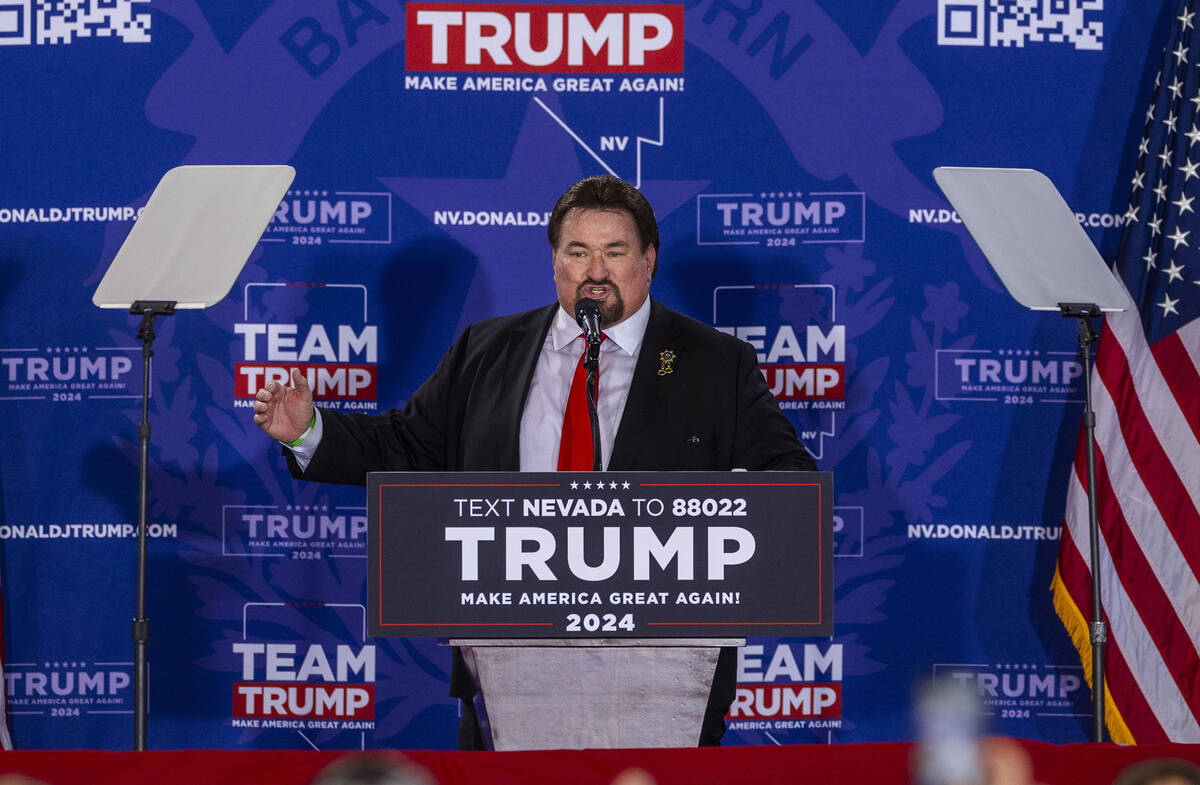Nevada’s Republican ‘fake electors’ call for their case to be dismissed

The lawyers for Nevada’s so-called fake electors filed motions Monday to dismiss the case. The motions also argued the state had failed to provide sufficient evidence.
Six Republicans were indicted by a grand jury in Clark County District Court in December and charged with offering a false instrument for filing and uttering forged instruments as a result of submitting fake elector documents declaring Donald Trump the winner of the Silver State.
The six Nevadans who were charged — and pleaded not guilty — are Nevada Republican Party Chairman Michael McDonald, Clark County Republican Party Chairman Jesse Law, Republican National Committeeman Jim DeGraffenreid, Nevada GOP Vice Chairman Jim Hindle III, Shawn Meehan and Eileen Rice.
After the 2020 election, the six electors gathered outside of the Nevada Legislature building in Carson City to sign the certificate giving the state’s electoral votes to Trump — even though Joe Biden won the Silver State by more than 30,000 votes. That certificate was sent to the president of the Senate, the archivist of the U.S., the Nevada secretary of state and the U.S. District Court for the District of Nevada, according to the office of the attorney general.
Carson City or Douglas — not Clark
On Monday, attorneys for the six filed motions that for the first time revealed the defendants’ counter-arguments. Led by Las Vegas lawyer Richard Wright, the attorneys argued the case should be dismissed, claiming the grand jury lacked jurisdiction, because the activities took place in other counties. The defendants met in Carson City to vote and sign the documents, which were later sent from Douglas County, according to the defendants’ lawyers.
The defendants are entitled to a jury trial — scheduled March 11 — and jury pool from the location where the alleged offenses took place, either Carson City or Douglas County.
The attorney general’s office declined to comment Tuesday, citing the pending litigation.
No intent to deceive
Even if the grand jury had jurisdiction, the charges still cannot stand, the attorneys argued in a separate memorandum filed Monday, claiming the statutes they were charged under do not address the conduct at issue.
“Instead, the charges are an effort to harshly punish defendants by trying to fit a square peg in a round hole,” they wrote.
Wright and the other attorneys wrote that the state failed to provide sufficient evidence that showed the electors knowingly filed false documents, and that there is a lack of evidence they had intended to defraud or deceive.
McDonald and the other electors were nominated as presidential electors at the Nevada Republican State Convention. At the time they voted and sent the electoral certificates, the Nevada Republican Party still had time to challenge the Nevada Supreme Court ruling that had upheld the 2020 election results. No evidence was presented to show the defendants had knowledge there would be more legal challenges to fight the election results, the attorneys argued.
There was no intent to deceive, the attorneys argued, because electors televised the ceremony, showing what they were doing, and the certificate had numerous flaws and was not an attempt to be construed as the real one.
Multiple witnesses testified to the grand jury that the documents were determined to be unofficial. They did not come from the State of Nevada, did not have a state seal, and did not match the signatures of the voters who were appointed by the state, according to the memorandum.
Even if a document contains false information, the attorneys argue in the filing, that alone does not constitute forgery. They claim the document is genuine because the signatures are genuine.
“There is a distinction between offering a forged document and offering a genuine document that contains false information and the latter is not ‘forgery,’” the lawyers wrote.
Exculpatory evidence
The defendants’ lawyers also highlighted information in a memorandum that they claim the grand jury did not receive. Counsel provided a letter Dec. 1, 2023, with exculpatory evidence — evidence that tends to clear a defendant of wrongdoing — and the attorney general was required by state law to present it to the grand jury, according to the attorneys.
It included precedents for the Nevada Republican electors’ actions, such as that alternate electors voted in the Hawaii 1960 presidential election.
Before the grand jury proceedings, the attorney general’s office conducted a recorded proffer session with former Trump attorney Kenneth Chesebro, during which he made multiple exculpatory statements that were not presented to the grand jury, the attorneys claim. He had described precedence for alternate electors voting in the Hawaii 1960 election involving John F. Kennedy and Richard Nixon, and that he believed the Trump campaign might have beyond Jan. 6 to win litigation.
“Mr. Chesebro never informed the Nevada electors that they should not vote if there is no ongoing legal challenge,” the lawyers argue.
The Nevada Republican electors “were selecting then President Trump and then Vice-President Pence as their nominees in the event that later challenges were successful.”
Motion to Dismiss by Jessica Hill on Scribd
Joint Memorandum of Points and Authorities in Support of Defendants' Petitions for Writ of Habeas Corpus by Jessica Hill on Scribd
Contact Jessica Hill at jehill@reviewjournal.com. Follow @jess_hillyeah on X.